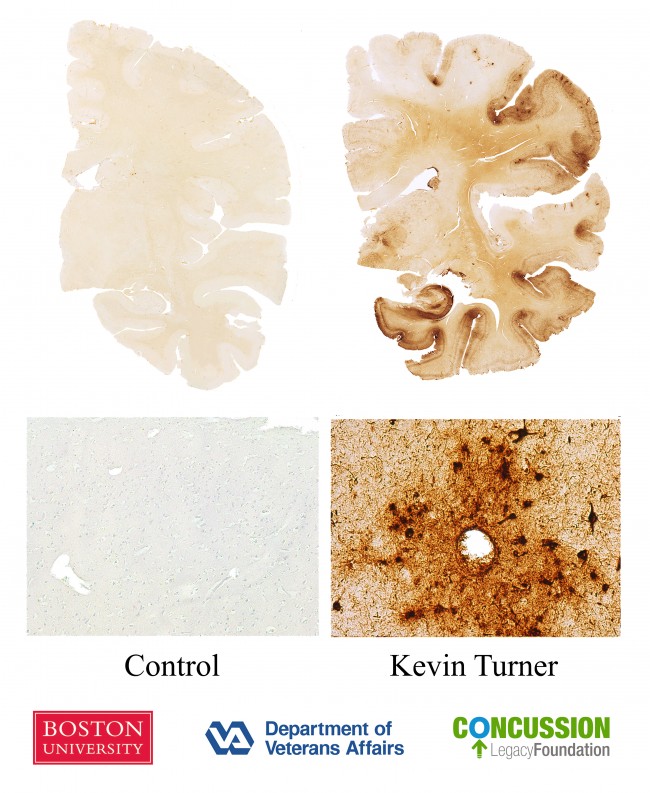BU Announces Former NFL Player Kevin Turner Had Advanced CTE
Researchers from the Boston University (BU) CTE Center, VA Boston Healthcare System and Concussion Legacy Foundation, at the request of the family and the Kevin Turner Foundation, disclosed today that Kevin Turner, a former National Football League (NFL) player who died from complications of amyotrophic lateral sclerosis (ALS) in March at the age of 46, had the most advanced stage of Chronic Traumatic Encephalopathy (Stage IV out of IV) with motor neuron disease. CTE is a neurodegenerative disease linked to repeated brain trauma that has been shown to cause ALS symptoms in some cases.
 Ann McKee, MD, presents at the 2016 BU CTE Continuing Medical Education Conference.
Ann McKee, MD, presents at the 2016 BU CTE Continuing Medical Education Conference.
Turner, a former fullback for the University of Alabama, Philadelphia Eagles and New England Patriots, was a leading plaintiff in the concussion lawsuit brought by former players against the NFL. Diagnosed with ALS in 2010, he pledged to donate his brain to the Concussion Legacy Foundation and created The Kevin Turner Foundation due to his suspicion that playing football may have been a contributing factor. That same year, BU and VA researchers led by Ann McKee, MD, discovered a connection between brain trauma, CTE and ALS, which led to ALS being included as a covered disease in the lawsuit settlement.
 Raymond Turner, Kevin’s father, talks with the media after formal presentation.
Raymond Turner, Kevin’s father, talks with the media after formal presentation.
Currently CTE can only be diagnosed by examining brain tissue post-mortem. Turner was diagnosed by McKee, who serves as professor of Neurology and Pathology at BU School of Medicine, director of BU’s CTE Center, director of the Neuropathology Service for the New England VA Medical Centers and chief of neuropathology for the VA Boston Healthcare System.
“The severity of Mr. Turner’s CTE was extraordinary and unprecedented for an athlete who died in his 40s,” McKee said. “While he had typical cognitive symptoms and problems with impulse control associated with CTE, it also appears that CTE decimated the motor cortex of his brain at a young age, likely leading to his ALS symptoms.”
 Photo credit: Ann McKee, MD, VA Boston Healthcare System/Boston University School of Medicine
Photo credit: Ann McKee, MD, VA Boston Healthcare System/Boston University School of Medicine
Image 1:
Top panel: Whole mount hemi-sections of the brain of a 60 year old control subject (left) and of Kevin Turner (right) immunostained for phosphorylated tau (p-tau) protein (brown areas).
The control brain shows no p-tau deposition, whereas the brain of Kevin Turner shows dense p-tau deposits throughout the frontal and temporal lobes.
Lower panel: Photomicrographs of normal control brain (left) showing no immunostaining for p-tau protein (left). In contrast, the brain of Kevin Turner (right) shows the defining pathology of CTE: p-tau in neurofibrillary tangles around a small blood vessel.
Dr. Robert Cantu, co-founder and medical director of the Concussion Legacy Foundation and clinical professor of neurosurgery at BUSM, said, “We believe the extreme severity of Kevin Turner’s disease is related to his 25-season career, and the fact he began playing tackle football at age 5, while his brain was still rapidly developing and more vulnerable.”
McKee added, “After now completing the analysis of the brains of 228 former football players, we have seen a clear trend that length of career is associated with CTE severity.”
The findings were announced during McKee’s presentation at the 2016 BU CTE Continuing Medical Education Conference, attended by more than 100 physicians, researchers and policy makers. McKee was joined by Turner’s parents, Raymond and Myra Turner; Tamara Alan, executive director of the Kevin Turner Foundation; and more than 70 family members of other brain donors who were attending the conference. The family chose to release the results as part of the Kevin Turner Foundation’s mission to raise awareness about the connection between brain trauma and motor neuron diseases like ALS.
“While learning the results has been devastating for Kevin’s family and those of us close to him, unfortunately, we cannot say we are surprised,” said Alan. “It’s the whole reason Kevin started his foundation, as if he knew instinctively that he was living Ann McKee’s findings about the CTE/ALS connection. Despite the devastation to Kevin’s brain, he stayed to true to the core as the caring man he always was, doing his best to warn others to avoid his fate. We will continue to honor Kevin’s wishes that we bring attention to this devastating disease.”
Turner’s brain is one of more than 380 brains donated since 2008 to the VA-BU-CLF Brain Bank, a collaboration between the US Department of Veterans Affairs, Boston University School of Medicine and the Concussion Legacy Foundation.
CTE is a progressive degenerative disease of the brain found in athletes, military veterans, and others with a history of repetitive brain trauma, including both concussive and subconcussive head impacts. CTE is characterized by deposits of an abnormal protein called tau in the form of neurofibrillary tangles, glial tangles, and neuropil threads throughout the brain and the presence of another protein – sometimes associated with motor neuron disease – known as TDP-43. These abnormal proteins are associated with the impaired functioning and eventual death of brain cells.
CTE risk does not appear to be directly associated with concussions or concussion history, but instead CTE severity has been associated with total brain trauma exposure. Other risk factors, including genetic risk factors, have yet to be determined. CTE has never been seen in an individual without a history of significant brain trauma exposure. Symptoms include memory loss, confusion, impaired judgment, paranoia, impulse control problems, aggression, depression, and eventually progressive dementia. CTE cannot yet be accurately diagnosed during like, and there are no proven treatments.
View all posts